| Srl | Item |
| 1 |
ID:
170901
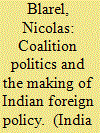

|
|
|
|
|
| Summary/Abstract |
Do Indian regional parties influence foreign policy and under which conditions? Some foreign policy studies have shown that certain coalition-building configurations have facilitated the inclusion of the concerns of small parties in the foreign policy debate. Other works have looked at the role of decentralization and federal power-arrangement in providing more control to political sub-units over the external affairs of a state. Those separate scholarships provide interesting insights to account for the multi-level nature of coalition-building in a federal and pluralistic polity like India. Bridging these two literatures, I argue that the interdependence of regional and national coalition building processes (visible in federal settings) create locked-in alliances between national parties and regional parties which affect foreign policymaking. In these contexts, India’s national parties have to, under certain conditions, take into account the preferences of regional parties when designing foreign policies. This article looks at the hypothesized causal mechanisms and expectations through two illustrative case studies of India’s foreign policy.
|
|
|
|
|
|
|
|
|
|
|
|
|
|
|
|
| 2 |
ID:
131062
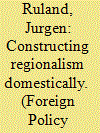

|
|
|
|
|
| Publication |
2014.
|
| Summary/Abstract |
There is a dearth of studies exploring the construction of ideas on regionalism outside Europe. This article seeks to make a contribution to close this gap. It examines the construction of ideas on regionalism in Indonesia, the largest member country of the Association of Southeast Asian Nations (ASEAN). Theoretically, the paper draws from Acharya's concept of "constitutive localization" which it develops further. It offers an alternative explanation to studies which argue that as a result of mimetic behavior, social learning, and cost-benefit calculations, regional organizations across the world become increasingly similar. While this may be the case in terms of rhetoric and organizational structure, it is not necessarily the case at a normative level. The Indonesian case shows that even though foreign policy stakeholders have increasingly championed European ideas of regional integration after the Asian Financial Crisis of 1997/1998, they have skillfully amalgamated them with older local worldviews through framing, grafting, and pruning. European ideas of regional integration thereby served to modernize and relegitimize a foreign policy agenda which seeks to establish Indonesia as a regional leader with ambitions to play a major role in global politics.
|
|
|
|
|
|
|
|
|
|
|
|
|
|
|
|
| 3 |
ID:
153398
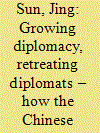

|
|
|
|
|
| Summary/Abstract |
This article examines the shrinking influence of the Chinese Ministry of Foreign Affairs (MFA) in China’s foreign policymaking, at a time when the country’s diplomatic needs are rapidly growing. By utilizing the theory of domestic sources of international relations, this article argues that the MFA has been under stress from all directions: sidestepped by Party leaders from the top, challenged by competing ministries horizontally, and mocked by the public from below. The article also assesses the consequences a marginalized MFA has brought to Chinese diplomacy.
|
|
|
|
|
|
|
|
|
|
|
|
|
|
|
|
| 4 |
ID:
160420
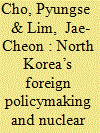

|
|
|
|
|
| Summary/Abstract |
This paper examines the determinants of North Korea’s foreign policymaking to show why denuclearization efforts continue to fail to curb, let alone end, its nuclear weapons program. Two determinants, namely South Korea’s existential threat and North Korea’s juche ideology, are explored to conclude that “nuclear North Korea” is a natural and non-negotiable manifestation of its foreign policymaking.
|
|
|
|
|
|
|
|
|
|
|
|
|
|
|
|
| 5 |
ID:
175661
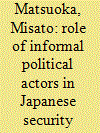

|
|
|
|
|
| Summary/Abstract |
Japan’s security policymaking has undergone change since 2012 amidst institutional reforms under the second Abe Shinzō administration. This article explores the under-appreciated role of informal political actors—especially heavyweight academics—in shaping Japanese security policymaking under the second Abe administration. Although these actors have always been present, this article argues that they have become more visible and influential, especially under the second Abe administration by supporting Japan’s Realpolitik stance. Differentiating from ‘embedded scholars’ (goyō gakusha), it scrutinises whether the activities of academics have become more relevant as part of a more centralised policymaking process. Considering the existing literature on Japan’s security policymaking and Kantei diplomacy, this article examines the extent to which informal political actors have exerted influence on Japan’s security policymaking, with explicit comparison with earlier governments. It particularly focuses on the role of Kitaoka Shin’ichi, a Japanese academic who has played the central role in shaping Japan’s security policymaking in the post-Cold War period. In so doing, this article explores the ways in which Abe’s Kantei-led political decision-making style has empowered informal political actors to contribute to strategic thinking regarding Japanese foreign and security policy.
|
|
|
|
|
|
|
|
|
|
|
|
|
|
|
|